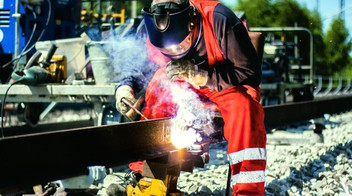Our inner ambition
Our inner ambition is to ensure that Germany has a strong rail system. Building a strong rail system will help our country to overcome existential challenges:
- For the climate. Today, no motorized means of transport is as climate-friendly and takes up less space on average than rail transport. In addition, no other means of transport is as electromobile – and therefore as low in greenhouse gases and pollutants – as rail transport, which holds the largest market share of e-mobility and e-logistics in Germany. No other mass transport can achieve a 100% share of renewable energies as quickly – by 2038, we will have converted the DB traction current mix to 100% eco-power. A strong rail system is therefore an essential prerequisite for meeting the climate protection targets of the Federal Government and the EU, because a reduction in emissions in the transport sector cannot be achieved without a massive expansion of the climate-friendly rail system. A strong rail system is a crucial beacon of hope for our climate. In concrete terms, the shift in the mode of transport towards a strong rail system for the climate means savings of up to 10.5 million t CO₂ per year, which corresponds to the annual CO₂ footprint of about one million people in Germany.
- For the people. By 2050, almost 85% of the population of Germany is expected to live in metropolitan areas, compared to 77% in the early 2020s. A consequence of this is that the growing amount of passenger and freight transport will present our cities and metropolitan areas with even more logistical, social and environmental challenges than they currently face. The situation is different in many rural areas. Here, one of the key challenges is preserving individual mobility opportunities. In the future, a strong rail system can continue to enable vibrant, urban coexistence and the accessibility of rural regions, because it will enable real freedom of mobility and allow travel time to be used in a variety of ways, without wasting valuable time. In concrete terms, a strong rail system for the people means doubling long-distance rail passenger volume sold, which translates to four million fewer car journeys and 12,000 fewer air passengers in Germany per day.
- For the economy. The demand for the transport of goods will continue to grow steadily in the coming decades. At the same time, commutes between metropolitan areas and surrounding regions as well as increasing flexibility in terms of workplaces and working hours will lead to higher demand for work-related mobility. With a strong rail system, this rising volume of traffic can be managed, enabling environmentally friendly economic growth. A strong rail system is therefore a crucial competitive factor for Germany’s future economic success. It secures Germany’s position as a leading exporting nation. With it, we are competing for the most modern transport logistics, and developing decisive technological stimuli for the future. In concrete terms, Strong Rail for the economy means growth in the modal share of rail freight transport to 25%. This corresponds to about 13 million fewer truck journeys per year on German roads.
- For Europe. Germany has a special responsibility for the future of Europe. As well as being the most populous country, it is also the geographic and economic heart of the continent. This role means Germany must be the pioneer and set the precedent for advancing European objectives. Climate protection, jobs, economic growth, social prosperity: much depends on Germany’s and Europe’s transport routes remaining future-proof. Strong Rail is the necessary link between East and West, North and South. In this context, it is not only an important instrument for cultural cooperation between the individual countries, but also a crucial factor in jointly achieving the goals set. In concrete terms, Strong Rail for Europe means working together to realize a European network.


